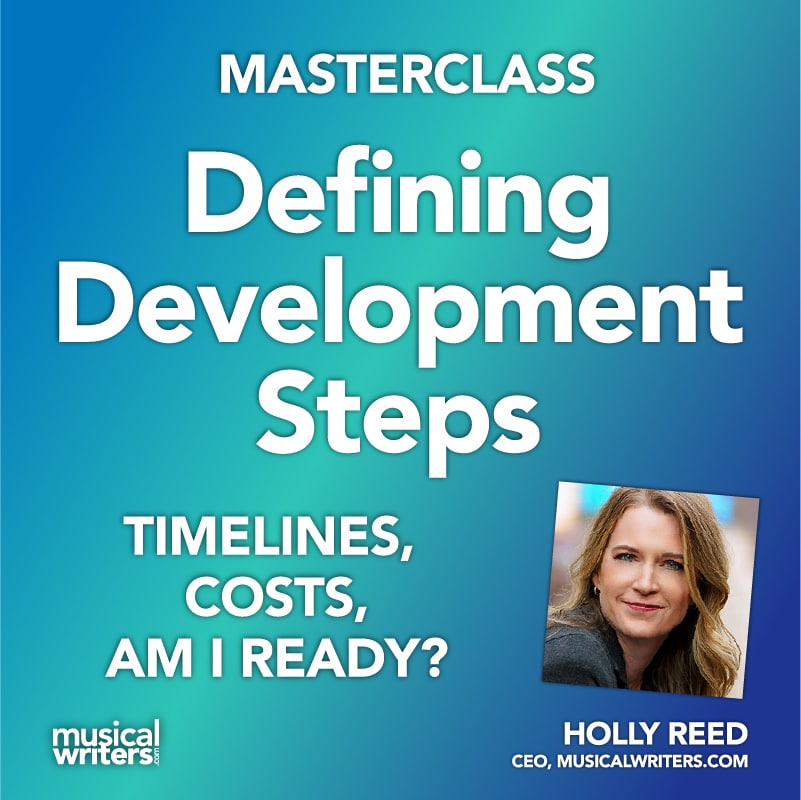Intermission is a critical point in an evening of musical theatre.
When show length is teetering between the 90-minute to 2-hour mark, a writer has to decide—intermission or no intermission? Is it best for the show to take a breather and allow the audience to ponder what’s already been told? Or would it be best to plow on through and keep the momentum up?
It’s an important question, and there’s no clear-cut answer.
But never assume you must have an intermission. Work through the positives and negatives, and justify it.
Let out a little line during intermission, but keep the audience on the hook.
If the audience is allowed to push the pause button and re-enter the reality—and mental hijack—of crowds, bathroom lines, and social media updates, then the creative team better have a carefully devised plan on how to keep at least a little hook in an audience member’s brain.
What lingers in thought as the house lights come up has much to do with the last thing the audience hears—the final song of Act 1.
According to Jack Viertel in The Secret Life of the American Musical, there are two conventional approaches to thematically structuring this song.
First, what he suggests is most typical: “the unraveling, in an instant, of everything everyone has planned.” 1
The “Unraveling Curtain”
This is how an act traditionally ends: in a crisis that seems completely beyond redemption.
~Jack Viertel 2
Good stories are built on conflict, and the best stories are built on LOTS of conflict. When your protagonist has a giant want and is willing to overcome all odds to get it, we stay on the edge of our seats. We’re championing them, rooting for them, and expecting that they’re going to emerge victorious. Then all of a sudden, the rug is pulled out from under them—and us. It’s almost like his or her best intentions completely backfire.
And what’s important here, is that the audience doesn’t have a solution any more than the protagonist does.
The “Unraveling Curtain” – Musical Examples
Guys and Dolls: “I’ve Never Been in Love Before”
Sky and Sarah have bared their souls to each other, and we believe it is their destiny to be together. They haven’t experienced these feelings ever before, and now the experience is more perfect than they could imagine. But as they get back home to the mission and discover Nathan has been busted for holding his crap game in Sarah’s mission, to which she thinks is the whole scheme behind the Havana trip, her heart is broken—and so is Sky’s—and the newfound taste of love on their lips instantly turns bitter.
Leaves the audience wondering: “Will their love recover?”
.
Gypsy: “Everything’s Coming Up Roses”
Unrelenting and delusional stage mom Rose has just been made privy to the news of her star daughter June running off (and away from showbiz) and eloping with Tulsa. It’s the death of a dream for both Rose and her “lesser” daughter Louise. Rose is now without June, Louse is now without Tulsa. The audience is slightly relieved, however, in hopes that Rose’s selfish pursuits are finished and perhaps a reconciliation with Louise and a wedding proposal from Herbie are in store.
(But that’s not very dramatic! BORING!). Ah….when a character’s want is so consuming that they can’t see a good thing when it’s staring them in the eye. Now THAT’s a good character!!
Thus when everything else has been destroyed, the monster turns on its own vulnerable young that is left, and because its very nature is to devour, it grasps its young with a twisted, delighted realization that this one—this precious one—MUST be the one that will satisfy. As Madame Rose sings (having “taken leave of her senses”), “Herbie and Louise cling to each other for safety, desperately afraid of how all of this could possibly end. And then the curtain falls.” 3
Leaves the audience wondering:“Will Rose drive Herbie and Louise away too?”
.
The “Mini Curtain Call”
The other option is more of a summary of what’s just happened. While it might help the audience remember all the characters and what their unique problems are, it doesn’t really leave them with a “cliffhanger.”
It can, however, introduce a plethora of possibilities for where the story might go. So instead of feeling anxious about a disaster that just occurred, the audience can spend their intermission curious about what new turn the story is about to take—so many to choose from!
This time it’s all about anticipation. 4
The “Mini Curtain Call” – Musical Examples
A Little Night Music: “A Weekend in the Country”
Family, former lovers, and future affairs…. and all manner of plot twists to be had when this volatile crew of characters get together for a weekend at the country house.
Leaves the audience wondering: “Will the lovers be found out? Who will be together in the end?”
.
The Producers: “Act I Finale”
After taking the entire first act to assemble their team for producing the biggest Broadway flop in history, Max Bialystock and Leo Bloom rehash how the team was put together. Employing a tinge of leifmotif, each character’s previous musical number now forms the hodge-podge musical number, Act 1 Finale. The naiveté on stage is thick, but the audience can see through the cracks in their scheme.
Leaves the audience in expectation: “This thing is going to go down in a blaze.”
.
Rent: “La Vie Bohéme”
Using the “list song” approach, “La Vie Bohéme” brings the whole cast together to celebrate both their individuality and togetherness. Although upbeat and celebratory, there is an underlying surrender to defeat.
Viertel observes about Rent’s Act 1 curtain song, “La Vie Bohéme”:
“We don’t know how Act 2 will play out, but we’re left with the sense that the entire structure of the community we’ve come to know and care about is on a precipice and not about to stop moving forward. Whether it will go completely over a cliff remains to be seen as the lights snap off onstage….” 5
___________
Read the rest of the Secret Life of the American Musical series here.
[icon name=”question-square” class=”icon-1.5x”] Have you thought about the Act 1 Curtain for your show? What are you sending your audience into intermission with? Curiosity? Anxiety? A recap? We’d love to hear how you’ve worked that out. Share in the comments below!
Footnotes
- The Secret Life of the American Musical, page 152
- The Secret Life of the American Musical, page 158
- The Secret Life of the American Musical, page 160
- The Secret Life of the American Musical, page 167
- The Secret Life of the American Musical, page 171

















